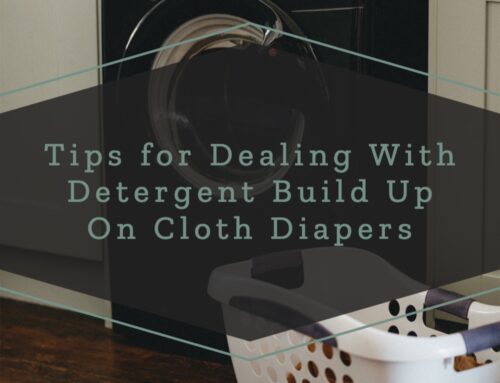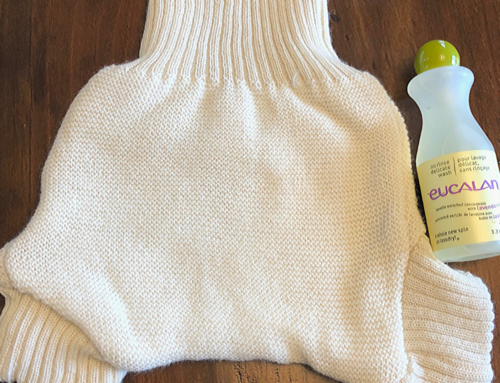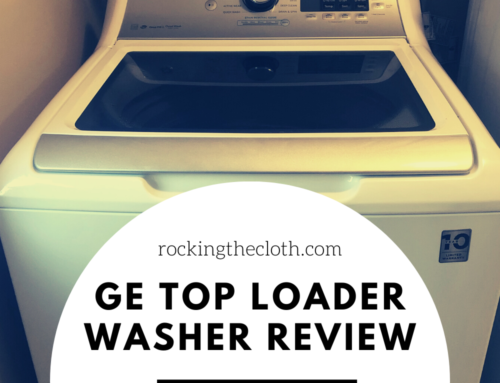Tide Original Powder is probably one of the most often recommended detergents for cloth diapers, and for good reason!
Point blank, Tide is effective. It’s ideal for hard water (which 85{9994046f29331ee04cc0b5e07eb28364315ea03ccc2f01b5a43e8b85b372d1e9} of the US has), it’s powerful, and it has a great reputation.
However, many people don’t like using Tide or other non-plant based detergents. They worry about the chemicals in the detergents and how they might affect their family’s health or the environment.
Most of the time, plant-based detergents are too weak to clean human waste effectively. However, there are some commonly recommended eco-friendly detergents that seem to get the job done. Biokleen is one of those!
Update January 2020: When I used this detergent and wrote this review, I had a top loader with agitator. That agitator helped clean diapers big time! Since writing this post, I have since moved to a house with a front loader HE washer. In my new washer, I have not had success with as many plant-based detergents. Just FYI that Biokleen may work awesome for you, or it may not do well with your water & machine. The rest of this post is how well it worked for me with my traditional washer.
Why Did I Switch to Biokleen?
In an effort to try to make my wash routine as eco-friendly as possible (while still being effective), I decided to try out Biokleen Laundry Liquid. I decided to use Biokleen over other recommended plant-based detergents for the following reasons:
- Good EWG rating (I don’t think the EWG is the end-all-be-all-but I often use their info as a starting point)
- Note: I’ve only ever used the EWG website, not the “Think Dirty” app. I’ve been made aware that their rating scales are different on the website and app. I am using the info I gathered from the website, where it receives an A rating. It scored differently in the app. Do with this what you will, but I can’t live my life worrying too much about this, heh.
- More economical than other plant-based detergents
- I loved that it only used essential oils for fragrances (see here the issues with artificial fragrances)
- Lots of reported success for use on cloth diapers
- I wanted to broaden my experiences with plant-based detergents to be able to make personal recommendations (I have also used the Kirkland Environmentally Responsible detergent with success, but did not continue with it because I could not stand the scent).
My Before & After Wash Routine
My wash routine remained the same with both Tide and Biokleen, but the amounts varied. I chose the amount for Biokleen based upon recommendations I found for cloth diapers online, and then I tweaked it a couple of weeks after starting it.
With Tide Original Powder, I would do a pre-wash (light wash) with line 1 of the detergent, then the main wash (regular or heavy option depending on how big it was and how long it has been since I last did diaper laundry) with somewhere between lines 2 & 3 of detergent. This was always effective for me.
For regular laundry, Tide says using up to line 1 of their detergent is fine for a normal size load. So for diapers, I would need to use 3-4x the recommended amount of detergent to get them clean. I keep track of this simply to track the economical part of this equation.
With Biokleen, I started with 1 capful in pre-wash, and then did 2 capfuls in the main wash. This seemed to work at first, but after a couple of weeks, they didn’t smell as fresh after drying. I increased the detergent amount to 2 caps in prewash and 2 in the main wash. This has been working. This is a total of 4x the amount of recommended detergent.
2 capfuls may sound like a ton, but if you actually look at a Biokleen detergent bottle, you will see it really isn’t as much as you might be envisioning. They have small caps.
How Did It Work?
After the tweak I made increasing the detergent amount, I have had no issues! I bury my face in my diapers as soon as they’re dry to check how clean they smell, and they have smelled very clean.
One thing that will be important to consider if you are switching from Tide (or similar) to a plant-based detergent is to prepare to deal with more staining. With Tide, I almost never had lasting stains. I definitely have more staining with Biokleen.
Personally, I’m not too concerned about staining. I’m only concerned about cleanliness. So if they’re clean but have a little stain, I’m okay with that.
Another item to consider is that plant-based detergents need to be used with hot water (at least for diapers–you could probably use Biokleen and cold water on less-soiled laundry), whereas with Tide you could probably get away with washing on cold for diapers.
Finally, liquid plant-based detergents like Biokleen do not have any water softeners in them. If your water is at all hard, you may need to add something like Calgon to your washer. These detergents do not work as well in hard water.
I recommend using a softener, like Calgon, if you have hard water and want to use a plant-based detergent. Test your water first–do not just assume. Over-softening your water has its own issues. See here for more information on washing in hard water.
Pros and Cons for Biokleen
Here are some pros & cons of choosing Biokleen:
Pros
- A healthier detergent choice that significantly reduces problematic chemicals used on your laundry
- A better environmental choice than Tide
- It does work for cloth diapers!
- Great scent–very light citrus scent out of the washer, but it fades very quickly after drying since these aren’t artificial fragrances.
- An economical choice as far as plant-based detergents go (averages to $0.18/capful based on the price I bought it at)
- Note about price per load: Don’t take the price per load given to you in the product details at face value. The price per load at the price I bought Biokleen at said $0.09 in the details, but that was for half a cap that they said was suitable for HE machines. Since I am using four full capfuls per load, that means my detergent cost $0.72/load of diapers and $0.18/load of regular laundry.
Cons
- A little more expensive than Tide
- I can only find it online (no local stores carry it in stock around here)
- Staining is more of an issue
- May require a water softening agent if used with hard water
- Is not recommended for cloth diapers if you have an HE machine–while it is an HE friendly detergent, the amount you will likely need to really get your diapers clean is more than you are supposed to use in an HE machine.
- I am always a big proponent of trying things for yourself if you’re up for the challenge and really want to know, so if you have an HE machine and want to use Biokleen laundry liquid. Let me know how that goes. I’d love to know! My advice would just be to make sure you have a working routine in place first that you can fall back on if it doesn’t do well.
Pros and Cons for Tide
Pros
- Without question, Tide works!
- Great for hard water
- Reduced staining
- Can often find sales or coupons to reduce the price
- Decent price per load (I buy it at Costco where it’s price averages $0.15/line 1 load, anywhere from $0.45-$0.60 per diaper load)
- Great for HE or regular machines
- I’ve used it with success washing on both cold and hot for diapers.
Cons
- Many people have concerns about the chemicals used in Tide for a lot of reasons pertaining to both health and the environment.
- Many people hate the scent of Tide.
Which Will I Continue to Use?
I would happily use either detergent. Considering I would like to reduce water pollutants, I will probably continue with Biokleen. However, if at any point in time my diapers started to suffer, I would move back to Tide Original Powder in a heartbeat. Sometimes we need to pick our battles and we can’t be perfect.
I also prefer powders to liquids, so next time I think I will try the Biokleen laundry powder.
Do you use Biokleen? Have you tried it on diapers? What do you think? Let me know in the comments!







Hello,
A very interesting review, its good to read about the two products and their pros and cons. Also your own experience of the two products make it sound a trust worthy review.
Good to find that eco friendly products are available and to have someones opinion of them , good and bad.
Thanks, Louise!
I have to be honest, I have always been a fan of Tide. But you have shown me a way to clean with fewer chemicals. Thanks!
Tide definitely works! Only downside is the harsh chemicals involved.
I find this very interesting– I’ve always done my cloth with way less soap than that. I did most of my cloth with an HE machine that had a Sanitary (like, boiling) setting. Cold water rinses with no soap to start, (first stool was rinsed out in the toilet) then when they were fully rinsed I would run a sanitary wash with just a regular amount of either Rockin’ Clean, which I used for a long time (but never knocked my socks off), BumGenius detergent (because I thought I had to buy something just for cloth) and then eventually, I just started using the same Seventh Generation or Trader Joe’s laundry detergent that I use for the whole house. Right now I think I’m using Arm & Hammer Free and Clear because I happened to be at Target last time I needed detergent. I have never had a problem with them stinking, so long as I’ve rinsed them really well. Also for the year that my son was regularly pooping in his diaper (now it’s just nighttime and naptimes and there’s rarely poopy cloth) I would add bleach once a month to the diaper wash. I guess in my cloth washing journey I started out super fussy; now it’s basically as bare bones as can be, and I still find they’re just as clean!
I’m glad you found what works for you! Wash routines are pretty individual. Just to be clear, this was a review specifically for Biokleen detergent compared to my experience with Tide. I’ve tried a number of detergents, but actually have never used Seventh Gen, Trader Joe’s, or Arm & Hammer! I’ll have to try them sometime.
I like to be as basic as I can for my wash routine, too. That’s why I just do a light wash with 2 caps of Biokleen (their caps are VERY small, much smaller than any other brand I’ve used) and a regular wash with 2 caps and call it good. But a lot of what people need to do to get their diapers clean depends on their machine and how hard their water is.
I don’t typically recommend the sanitation settings (though I do recommend hot or warm) because water that hot can damage PUL/TPU and ruin elastics over time. You will need less soap if you use water that hot, so that definitely makes sense. Water that hot will kill germs and odors. Bleach helps too, but I have probably only used bleach once or twice in the last 5 years of using cloth diapers. I prefer a routine that doesn’t require that kind of maintenance–different strokes! 🙂
It does depend on what type of diapers you use, though. PUL can withstand a little more heat than TPU can. It also depends on how many years of life you want to get out of your diapers. If you’re okay with just using one set of diapers for just a couple years, it’s probably fine.
I tried with less soap at first and it built up stink, so I definitely needed to add it a little more detergent and that fixed the issue right up!
What a nice post you wrote! I really enjoyed reading it and I could not be silent about your post so I decided to leave my comment here and say Thank You! For sharing this quality post with others.
Actually this is exactly the information that I was looking for about differences between tide and biokleen and when I landed to your website and read this post, it answered all my questions in details.
So I’m happy that you decided to write about this topic and share it with people. It’s very useful and can definitely be used as a great source for pros and cons of tide and biokleen.
I will come back to your website again for sure and I’m looking forward to read your new posts.)
Thanks!
Thanks Ali!
I’m curious if you ever tried Biokleen laundry powder vs the liquid, and did it work as well? I’ve been using the powder for all of my family’s laundry for a few years now, but we’re about to add baby #3 to the family after not having a kid in diapers in for over 5 years. I’m very out of practice with washing cloth! About to prep all the newborn diapers and the ones I saved that survived with their elastic intact. I’m hopeful I can keep using what I’m using now with the diapers too.
Hi Lisa! Unfortunately, I never got a chance to try the powder. I don’t see why it wouldn’t work, though! We ended up moving back in June, and my new washing machine isn’t the greatest, which has really limited my ability to play around with detergents. 🙁 I have an HE washer now and it hasn’t proven so well with plant-based detergents on my diapers like I was able to use back when I had a regular washing machine. I hope it works well for you! My guess is if you have a regular washing machine, you should be able to get it to work effectively.